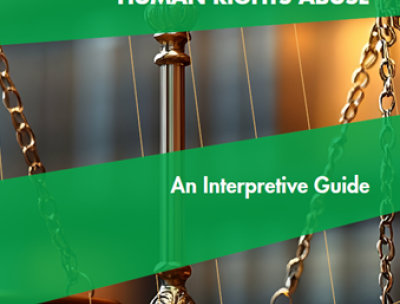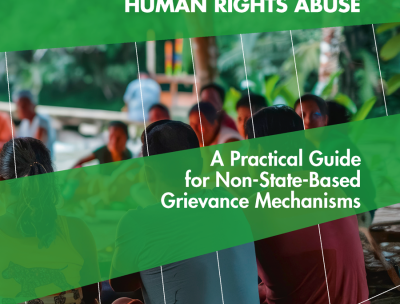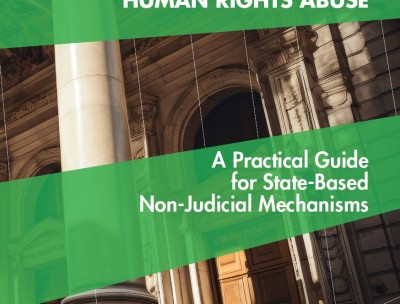OHCHR and business and human rights

About business and human rights
States are obligated under international human rights law to protect against human rights abuse within their territory and/or jurisdiction by third parties, including business enterprises. Even if States do not fulfill their obligations, all business enterprises are expected to respect human rights, meaning they should avoid infringing on the human rights of others, and should address adverse human rights impacts with which they are involved. If abuses occur, victims must have access to effective remedy through judicial and non-judicial grievance mechanisms.
OHCHR's work on business and human rights
OHCHR leads the business and human rights agenda within the UN system.
OHCHR develops guidance and training relating to the dissemination and implementation of the UN Guiding Principles on Business and Human Rights for States, business, civil society, and other relevant stakeholders. This means:
- providing advice, tools and other resources;
- supporting capacity building on business and human rights to all stakeholders, including through OHCHR's field presences and across the United Nations system; and
- acting as secretariat for human rights mechanisms and bodies, such as the Working Group on Business and Human Rights and the inter-governmental group developing a business and human rights treaty.
Major Initiatives
The office is currently engaging in a number of major initiatives on priority topics and geographic areas:
- Accountability and Remedy Project (ARP): to enhance accountability and access to remedy in cases of business-related human rights abuse
- Business and Human Rights in Technology Project (B-Tech Project): to provide authoritative guidance to enhance the quality of implementation of the UNGPs with respect to digital technologies
- Business and Human Rights Africa Project: to build strategic and impactful BHR engagement, foster the implementation of BHR standards and strengthen accountability for adverse business-related human rights impacts in the African region
- Responsible Business Conduct in Latin America and the Caribbean (RBCLAC): working together with the Working Group on Business and Human Rights, the ILO, and the OECD to boost UNGP implementation in the region
- BHR Peer Learning Project: to support the business community in implementing the UNGPs in different national and regional contexts
- BHR oPt database: implementing the mandate of the Human Rights Council on Israeli settlements in the Occupied Palestinian Territory pursuant to HRC 31/36.
Key documents
United Nations Guiding Principles on Business and Human Rights (UNGPs)
The UNGPs are the global standard for preventing and addressing the risk of adverse impacts on human rights involving business activity, and they provide the internationally-accepted framework for enhancing standards and practices with regard to business and human rights. The Human Rights Council unanimously endorsed the Guiding Principles in its resolution 17/4 of 16 June 2011.
Frequently Asked Questions on the Guiding Principles on Business and Human Rights
This publication raises and answers frequently asked questions regarding the background and content of the Guiding Principles and how they relate to the broader human rights system and other frameworks. It aims to help both practitioners and newcomers to navigate and understand the Guiding Principles.
The Corporate Responsibility to Respect Human Rights: An Interpretive Guide
This interpretive guide provides additional background explanation to the Guiding Principles relating to the corporate responsibility to respect human rights. It is a resource for business, governments, civil society, investors, lawyers and others who engage with business on human rights to support a fuller understanding of the meaning and intent of the Guiding Principles. It was developed in full collaboration with the former Special Representative of the Secretary-General on the issue of human rights and transnational corporations and other business enterprises.
Access to Remedy in Cases of Business-related Human Rights Abuse: An Interpretive Guide (Advance Version)
This interpretive guide provides additional background explanation on the principles of the access to remedy pillar of the Guiding Principles so as to support a full understanding of their meaning and intent. It aims to equip all actors, whether specialist or non-specialist, with the knowledge and insights needed for more productive engagement and advocacy in relation to access to remedy for business and human rights harms in a wide range of contexts. This is an advance version of the guide; a professionally designed and translated version of the guide will be published as soon as it is ready.
PDF (advance version): English
Latest reports
Contact Information
Email: OHCHR-bhr@un.org
Activities
Consultation and call for submission on the application of the UNGPs to the activities of technology companies , 7-8 March 2022
ARP Consultation exploring the links between human rights due diligence, accountability, and access to remedy, 3-4 March 2022
Human Rights Council panel discussion on the tenth anniversary of the UNGPs (report)
29 June 2021
OHCHR submission to the Working Group’s UNGPs 10+ project
OHCHR Training Modules on the Principles for Responsible Contracts







